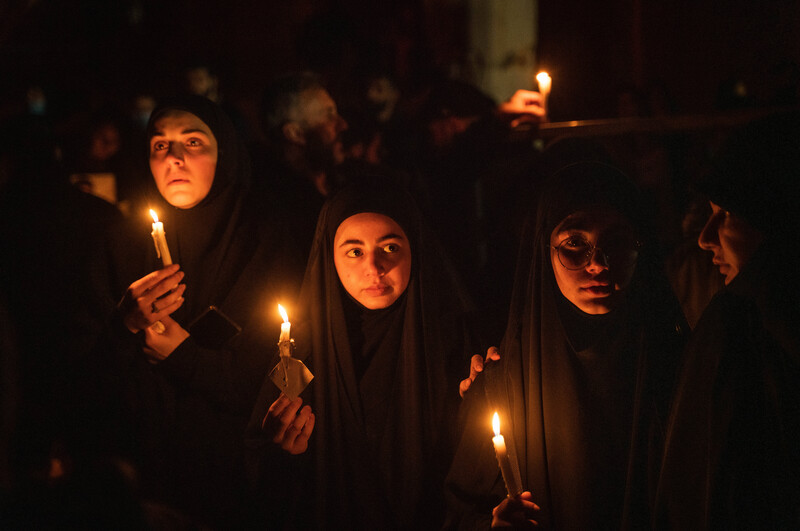The Electronic Intifada 5 December 2024

A vigil for assassinated Hizballah leader Hasan Nasrallah was held in Beirut on 1 December just days after a ceasefire in Lebanon was agreed.
SIPADespite several violations and a deeply unpredictable situation, the truce in Lebanon that began on 27 November is just about holding.
In Gaza, the Lebanon ceasefire has been met with both relief – for the security of a neighboring ally – and as a painful reminder of our own isolation. The people of Lebanon may find a moment of reprieve, but Gaza is left to grapple with its own ongoing nightmare.
This raises difficult questions: Are we being forgotten, even by those who have historically stood with us? Have we been abandoned by our allies?
Does this mean that the genocide against Gaza will continue indefinitely?
Lebanon’s Hizballah movement has long been Gaza’s closest ally, showing unwavering solidarity during the darkest times. The truce brings hope for Lebanon’s children and families, who may finally enjoy a sense of safety.
It is comforting to imagine a child in Lebanon playing freely, studying for exams, or sleeping peacefully in a secure home. For those in Gaza, long deprived of such peace, this prospect is both touching and bittersweet.
Once the news of the ceasefire broke, Hamas announced yet again, that it was ready to reach a “serious” ceasefire agreement in Gaza.
The movement also lauded Hizballah’s pivotal role in supporting Gaza, highlighting its leadership’s sacrifices, particularly the assassination of former leader Hasan Nasrallah in an Israeli airstrike.
Osama Hamdan, a senior Hamas leader, struck a similar note in his comments to the media: “Any ceasefire announcement in Lebanon is welcomed. Hizballah stood by our people and made significant sacrifices.”
Shared pain
A discussion among friends yielded a mixture of envy and happiness. However, everyone agreed on one point: Our suffering does not mean we wish it on others.
Nobody felt abandoned by Lebanon. Rather, as one friend put it, they feel abandoned by the world.
“The world has ignored its own laws and rules for Israel. So, I think most of us already feel forgotten. But at least Lebanon stood up. I hoped we could achieve a ceasefire together, but we’re still happy to see others not suffering.”
Others expressed profound gratitude for the sacrifices made by the Lebanese people and Hizballah. The ceasefire in Lebanon brings relief to the Lebanese.
Only those who have experienced war can truly understand the immense value of living without constant fear.
War is a curse. It is even more so when, as we see in Gaza, confronted by an enemy that fears no consequences and shows no regard for human life.
Israel will kill, break the rules, starve people and commit all kinds of crimes, right the way up (or is it down?) to genocide.
And in Gaza, this genocide continues. For weeks, relentless bombardment has claimed thousands of innocent lives, with hundreds of deaths each week.
The destruction has left 2.3 million people starving, homeless and desperate. The world remains largely silent.
Media outlets misrepresent the situation as a “war,” implying an equal conflict between opposing forces, rather than the obvious massacre of a civilian population by one of the world’s most powerful militaries.
The silence of world governments, and the indifference that accompanies it, weighs heavily on people here, and the question arises: Will this genocide ever end?
What remains unchanged in both Gaza and Lebanon is the source of suffering.
The blame does not lie with the land or the people, but with the actions of a state that violates international law and commits atrocities with impunity. This aggressor, emboldened by a lack of accountability, poses a threat to the entire region and beyond.
The suffering in Gaza and Lebanon should remind the world that inaction today will only lead to greater suffering tomorrow.
In Gaza, this affects not only the physical survival of people here, but also their mental and emotional well-being. The daily threat of airstrikes, the constant loss of life and the never-ending grief are taking an irreversible toll on our lives.
The shared pain and resilience of the Lebanese and Palestinian people stand as a testament to their unbreakable spirit. The people of Gaza hold onto the hope that Lebanon may find peace, even as we remain trapped in our own ongoing struggle.
Despite the hardships, we continue to believe that, one day, justice and humanity will prevail.
Hassan Abo Qamar is a writer based in Gaza.




